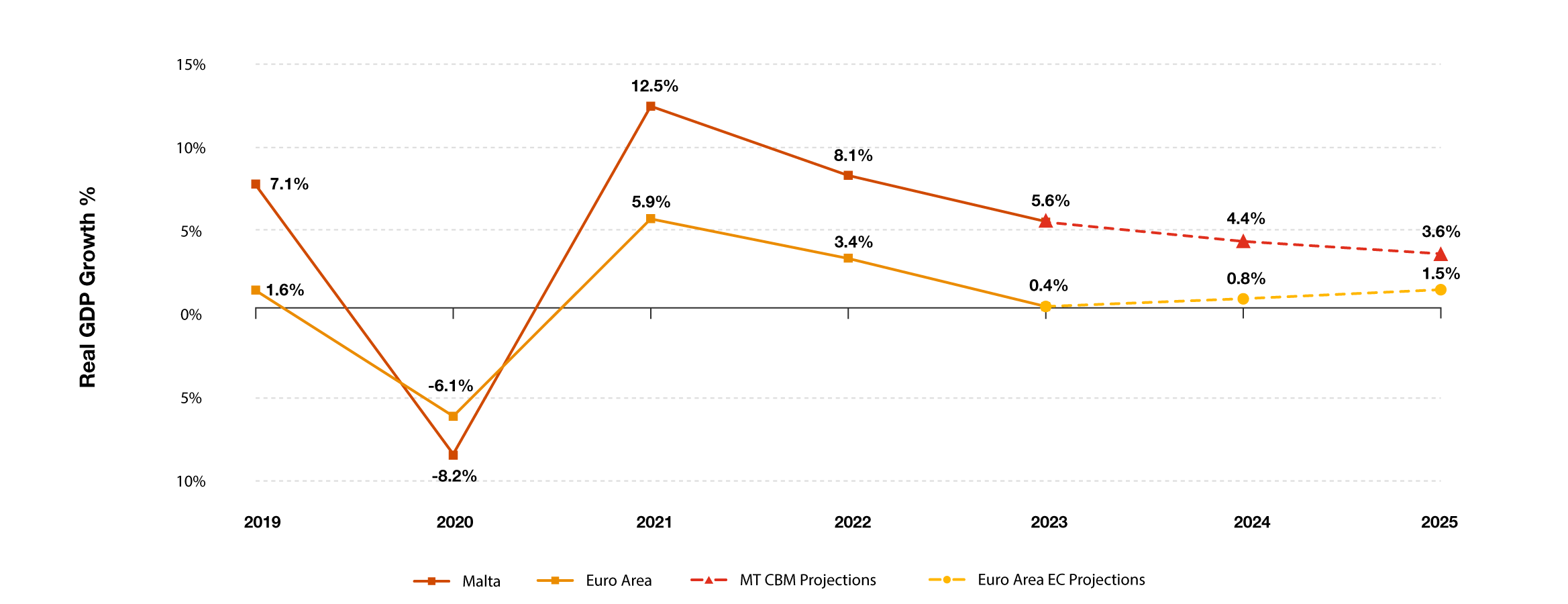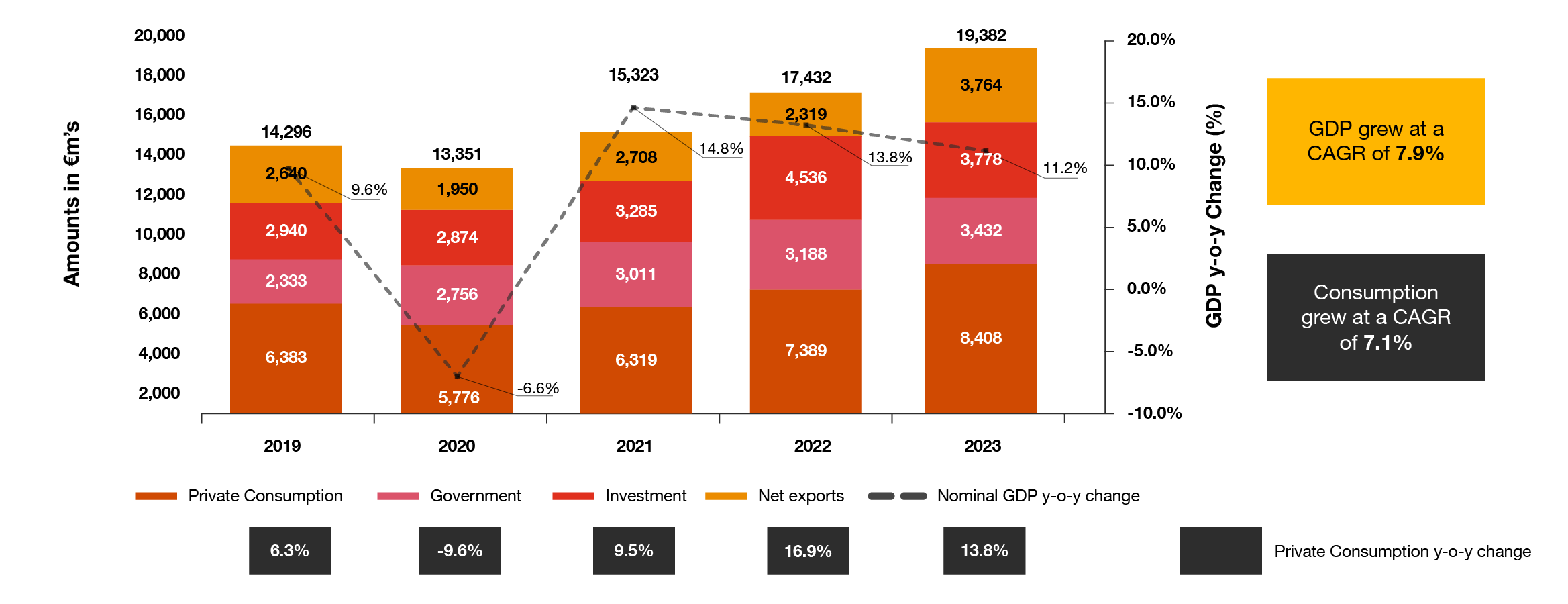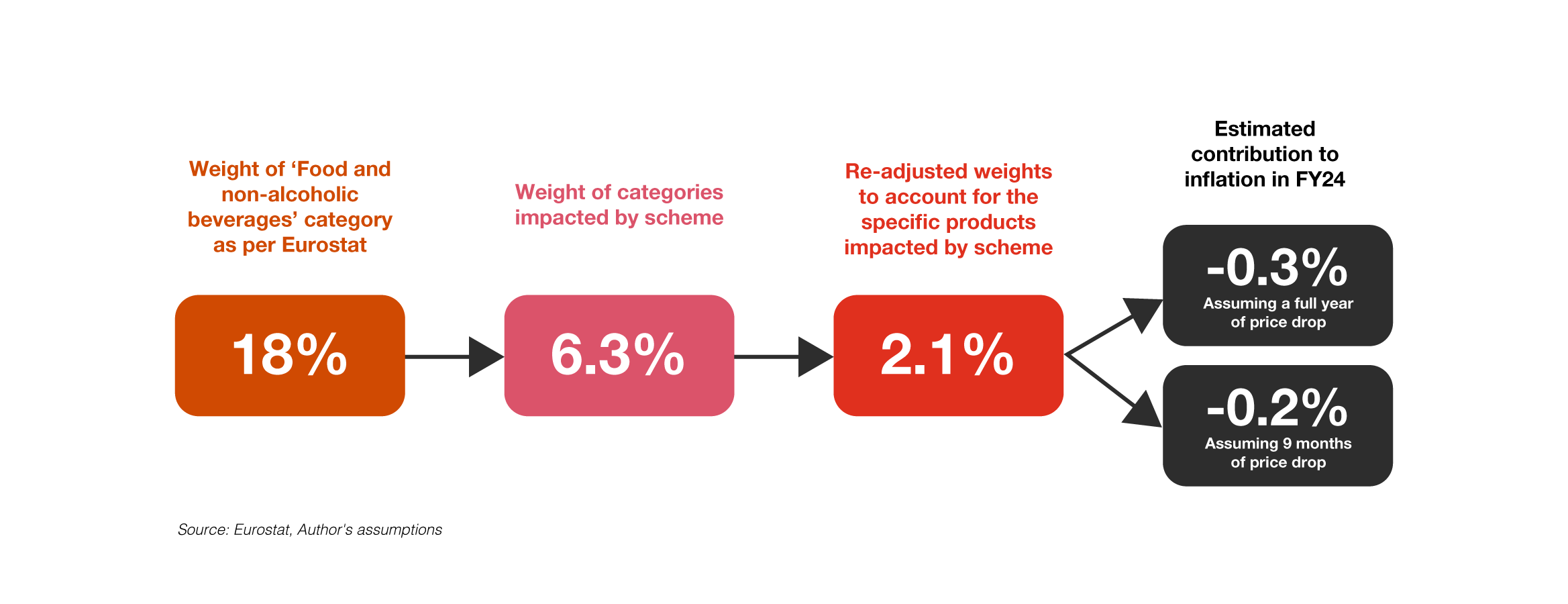Global growth is expected to slowdown in FY24 when compared to the previous year, with a marginal pick-up projected in FY25.
The PwC Network’s latest projections indicate a decline in GDP growth rates in FY24 for various main economies, such as the United States, Japan, Italy and France. On the other hand, Germany is expected to recover somewhat from recession and re-enter positive territory in FY24. Growth in the euro area on average is expected to remain more or less flat at 0.7% in FY24 from 0.6% in FY23, and then projected to reach 1.5% in FY25 as interest rates begin to decline. Against this backdrop, official projections for Malta continue to point to robust growth in FY24, at 4.4%, decelerating from 5.6% in FY23.
Official figures for FY23 show that Malta’s GDP has grown by more than previously expected. Going-forward, Malta’s economic growth is expected to slow down whilst the EA average growth is expected to moderately increase
Real GDP Growth

Sources: European Commission Winter 2024 Economic Forecast, Central Bank’s Forecast 2023-2026 (February 2024) – CBM
Domestic consumption is the largest contributor to GDP, and outperformed headline economic growth in FY22 and FY23, following weaker years in FY20-FY21...
Post-Covid, domestic consumption has been one of the main drivers of headline GDP growth in Malta in FY22 and FY23, following a sharp reduction in 2020 and a recovery year in 2021. When analysing the period 2019-2023, the nominal growth rates in GDP and consumption appear to be similar, at 7.9% and 7.1% respectively, implying that over the period consumption growth in Malta was largely in line with that of the overall economy. In essence, the growth in consumption during the post-covid years effectively made-up for the relatively sharper decline in consumption versus overall GDP experienced during the covid years.
GDP Components

Source: Central Bank of Malta, PwC analysis
However when accounting for inflation and population growth, real consumption per capita remains more or less flat compared with 2019
In nominal terms, consumption per capita increased from €12.4k in 2019 to €14.9k in 2023, implying growth of 20% over the period, or a CAGR of 4.7%.
However, when accounting for the effect of inflation, real consumption per capita increased from €11.8k to €12.5k, implying growth of c.5% over the period, or a CAGR of 1.3%.
Inflation in Malta has exceeded the EA average in 2023 and is also expected to do so in 2024; driven mostly by food and service price inflation
In 2024, inflation is expected to decline in the EU and globally, following elevated levels in 2023 and record highs in 2022. While Malta’s inflation rate is projected to experience a decrease from 5.6% to 2.9%, it still remains above the EU average of 2.7%. In the U.S, the monetary policy tightening appears to have been relatively successful in slowing down demand-induced inflation, without casuing a recession or even a significant slowdown in economic activity.
Inflation in Malta in 2023 was largely driven by the food & non alcoholic beverages and services components, which experienced inflation of 10.6% and 5.1% respectively. Food price inflation stemmed from both processed and unprocessed foods, while services price inflation was largely driven by price movements in hotels & restaurants and services relating to household maintenance.
Inflation: 2023 vs 2024 Projections
Government scheme – ‘Stabbiltà fil-prezzijiet’
According to Eurostat, food and non-alcoholic beverages made up the largest proportion of household’s expenditure, accounting for up to 18% of the total household consumption basket. Furthermore, this category experienced some of the highest inflation in 2023, averaging 10.6% for the full year. As a result, out of the 5.6% annual inflation in Malta in 2023, Food and non-alcoholic beverages contributed around 2.0 p.p., making it by far the largest contributor to headline inflation out of the ten categories as compiled by eurostat.
It was against this context that the Government of Malta introduced the 'Stabbiltà fil-prezzijiet' scheme, which seeks to achieve a 15% reduction on the retail recommended price (RRP) for around 400 food products, with the aim being the mitigatation of inflationary pressures on food products.
When mapping these food types onto the official food sub-categories as specified by Eurostat (at the 5-digit level), these food products appear to account for some 6.3% of the overall basket of goods consumed locally which feature in the HICP. However, the 400 products selected as part of the Scheme do not account for the entirety of products and brands on offer within each sub-component. A high level analysis of the products selected as part of the scheme would indicate that these products account for, on average, around one-third of the available products available to buyers. When accounting for this, it is assumed that the 400 products selected represent some 2.1% of the overall HICP basket.
On this basis, it can be deduced that the contribution of these selected 400 products to the 5.6% headline inflation experienced in 2023 amounts to around 0.22 percentage points.
Using the same assumptions, a 15% reduction in the prices of these products for a full year in FY24 could therefore lead to a downward contribution to inflation c.0.31 percentage points in the coming year. If the reduction is only held for 9 months, the effect would naturally be lower, at around 0.23 percentage points.

Finally, preliminary data for the first few months of 2024 imply that economic sentiment in some sectors may already have started to decline, in line with official forecasts of a slowdown in headline GDP growth expected for the two years ahead. Inflation has continued to moderate in the first two months of the year but remains above the euro area average and has some way to go before reaching the 2% target, as food and service price inflation remain elevated from a historical perspective.
Contact us















